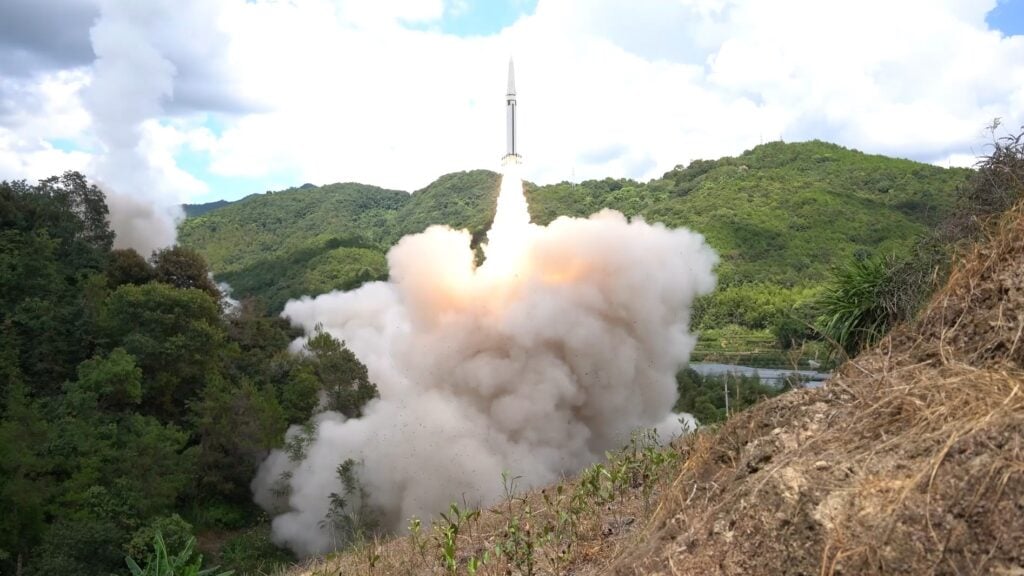Video screenshot shows a missile launched by the rocket force of the Eastern Theater Command of the Chinese People’s Liberation Army PLA. (Photo by Xinhua via Getty Images)
WASHINGTON — A new study by RAND finds that China’s military over the past decade has become more willing to use risky, provocative behavior in space to forward its political objectives, and less willing to communicate with the US Defense Department and the Space Force even during a crisis.
The report, “China’s Growing Risk Tolerance in Space: People’s Liberation Army Perspectives and Escalation Dynamics” published June 24, is based on a review of recent “authoritative” open-source literature from “across the Chinese defense enterprise,” explain authors Howard Wang, Gregory Graff, and Alexis Dale-Huang.
“The findings suggest that the PLA’s thinking on escalation dynamics in space has become significantly more risk-tolerant than that found in PLA documents published just a decade prior. This shift emphasizes Xi Jinping’s guidance to be more proactive in shaping the international environment, which includes accepting higher but carefully calibrated levels of risk even though such proactive measures might result in unintended escalation with the United States,” the report summarizes.
Further, RAND warns that Chinese leaders have “inflated threat perceptions of the United States” — viewing US actions as aimed at maintaining global “hegemony.” Thus, they tend to “interpret U.S.-led efforts to establish crisis communication mechanisms or broader space norms as tools to control China’s behavior.”
Brian Weedon, a space policy analyst now at the Aerospace Corporation’s Center for Space Policy and Strategy, called the RAND report an “Important new work on the security dilemma and escalation dynamics affecting space security” in a June 26 LinkedIn post.
The RAND report bluntly warns that the US likely will not have any “direct means for arresting unintended crisis escalation in space,” and will need to quickly make decisions about how “to achieve a version of stability that Chinese leaders will tolerate” — probably without “cooperation with the PLA.”
The authors recommend that the US “avoid investing costly efforts or making significant policy concessions to establish crisis communications mechanisms with the PLA. Given the CCP [Chinese Communist Party] history of aversion to crisis communications with the United States, PLA overtures to discuss such mechanisms might not be made in good faith.”
The report’s recommendations on communications is interesting given that in recent months senior Space Force officials have said that their Chinese counterparts have been tentatively trying to break the ice with them on the issue of space safety. Further, in a June 10 speech, the State Department’s number two official, Kurt Campbell, said that he expects US efforts to restart frozen military-to-military talks with the PLA will soon show results — noting that the State Department believes “China is also invested in trying to head off potential areas of misunderstanding.”
The RAND authors also assert that given the “PLA’s push to proactively shape its strategic environment,” the US Space Force should expect to “face a bellicose PLA eager to assert itself in space during peacetime.” Thus, the Space Force “should anticipate that PLA provocations in peacetime likely comprise a new normal in day-to-day space operations that involve China.”
However, the RAND authors stress that any PLA “proactive steps” or risky behaviors “remain subordinate to political decisionmaking,” so recommend that Space Force operators charged with figuring out how to react “should anticipate that the PLA is not likely to take proactive, escalatory steps in a crisis if those steps undermine its ability to prosecute such politically imperative missions as a war over Taiwan.”


















.png)


Discussion about this post